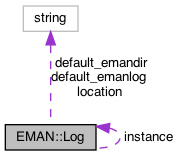Log defines a way to output logging information. More...
#include <log.h>

Public Types | |
| enum | LogLevel { ERROR_LOG , WARNING_LOG , DEBUG_LOG , VARIABLE_LOG } |
Public Member Functions | |
| int | begin (int argc, char *argv[], int ppid) |
| begin() and start() are used by command-line programs More... | |
| void | end (int ref, const string &file="-", const string &text="") |
| void | error (const char *format,...) |
| log an error message. More... | |
| void | warn (const char *format,...) |
| log a warning message. More... | |
| void | debug (const char *format,...) |
| log a debug message. More... | |
| void | variable (const char *format,...) |
| log a very-detailed-level debug message. More... | |
| void | set_level (int level) |
| void | set_logfile (const char *filename) |
| set log output file. More... | |
| void | loc (LogLevel level, const string &file, int linenum, const string &func) |
Static Public Member Functions | |
| static Log * | logger () |
Private Member Functions | |
| Log () | |
| Log (const Log &) | |
| ~Log () | |
| void | vlog (const char *format, LogLevel level, va_list arg) |
Private Attributes | |
| FILE * | out |
| LogLevel | log_level |
| string | default_emandir |
| string | default_emanlog |
| string | location |
Static Private Attributes | |
| static Log * | instance = 0 |
Detailed Description
Log defines a way to output logging information.
1) The logs can either go to standard output (default), or go to a user-given file. 2) 4 verbose log levels are defined. by default, ERROR_LOG is used. 3) Typical usage: Log::logger()->set_level(Log::WARNING_LEVEL); Log::logger()->error("cannot open file");
Member Enumeration Documentation
◆ LogLevel
| enum EMAN::Log::LogLevel |
Constructor & Destructor Documentation
◆ Log() [1/2]
|
private |
Definition at line 49 of file log.cpp.
References default_emandir, default_emanlog, ERROR_LOG, location, log_level, and out.
Referenced by logger().
◆ Log() [2/2]
◆ ~Log()
|
private |
Member Function Documentation
◆ begin()
| int Log::begin | ( | int | argc, |
| char * | argv[], | ||
| int | ppid | ||
| ) |
begin() and start() are used by command-line programs
Definition at line 177 of file log.cpp.
References default_emandir, default_emanlog, and EMAN::Util::sbasename().
◆ debug()
| void Log::debug | ( | const char * | format, |
| ... | |||
| ) |
◆ end()
| void Log::end | ( | int | ref, |
| const string & | file = "-", |
||
| const string & | text = "" |
||
| ) |
◆ error()
| void Log::error | ( | const char * | format, |
| ... | |||
| ) |
log an error message.
log level = ERROR_LOG. Its args are the same as printf().
Definition at line 156 of file log.cpp.
References ERROR_LOG, and vlog().
Referenced by EMAN::CCDNormProcessor::process_inplace().
◆ loc()
| void Log::loc | ( | LogLevel | level, |
| const string & | file, | ||
| int | linenum, | ||
| const string & | func | ||
| ) |
Definition at line 88 of file log.cpp.
References EMAN::Util::int2str(), location, log_level, and EMAN::Util::sbasename().
◆ logger()
|
static |
Definition at line 80 of file log.cpp.
References instance, and Log().
Referenced by EMAN::CCDNormProcessor::process_inplace(), and EMAN::Util::set_log_level().
◆ set_level()
| void Log::set_level | ( | int | level | ) |
Definition at line 165 of file log.cpp.
References log_level.
Referenced by EMAN::CCDNormProcessor::process_inplace(), and EMAN::Util::set_log_level().
◆ set_logfile()
| void Log::set_logfile | ( | const char * | filename | ) |
◆ variable()
| void Log::variable | ( | const char * | format, |
| ... | |||
| ) |
log a very-detailed-level debug message.
log level = VARIABLE_LOG. Its args are the same as printf().
Definition at line 132 of file log.cpp.
References VARIABLE_LOG, and vlog().
◆ vlog()
|
private |
◆ warn()
| void Log::warn | ( | const char * | format, |
| ... | |||
| ) |
log a warning message.
log level = WARNING_LOG. Its args are the same as printf().
Definition at line 148 of file log.cpp.
References vlog(), and WARNING_LOG.
Member Data Documentation
◆ default_emandir
|
private |
◆ default_emanlog
|
private |
◆ instance
◆ location
|
private |
◆ log_level
|
private |
◆ out
|
private |
The documentation for this class was generated from the following files: